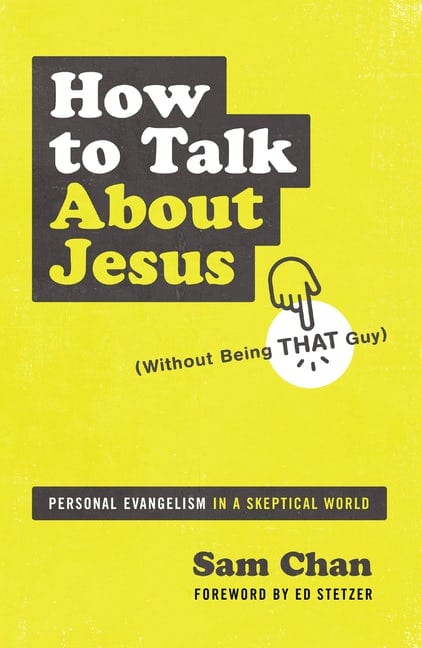There’s a fascinating tension in the Bible, and it’s mirrored in the titles of two forthcoming books. Here’s the biblical tension: “Keep your conduct among the Gentiles honorable, so that when they speak against you as evildoers, they may see your good deeds and glorify God on the day of visitation” (1 Pet. 2:12).
Peter writes of a radiant church attracting the pagans to true worship. But it’s not straightforward. Something else is going on too. Our goodness attracts not only praise but also accusations, persecution, slander, and hatred. We are attractive and repellent, radiant and reviled. And we should calibrate our expectations accordingly.
That’s the biblical tension reflected in two new titles. Both are excellent books on living distinctly in difficult times, and both are by Australians working with the same evangelistic ministry, City Bible Forum, based in Sydney. Their titles, though, could not be more different.

How to Talk About Jesus (Without Being That Guy)
Sam Chan
Drawing from over two decades of experience as an evangelist, teacher, and pastor, Sam Chan explains why personal evangelism feels so awkward today. And using recent insights from communication theory, cross-cultural ministry, and apologetics, he helps you build confidence in sharing your faith, and teaches you how to evangelize your friends and family in socially appropriate ways.
Sam Chan’s How To Talk About Jesus (Without Being That Guy): Personal Evangelism in a Skeptical World features a sunny yellow cover. Stephen McAlpine’s Being the Bad Guys: How to Live For Jesus in a World That Says You Shouldn’t is blood red. Chan wants to save you from being that guy. McAlpine wants you to own the bad-guy label and witness for Christ anyway.
Which title are you drawn toward? As a reviewer, here’s my confession: Chan’s title put me off.
Temperamentally and theologically, I’m more belligerent. When Dan Strange speaks of the gospel as the “subversive fulfillment” of the world’s hopes and desires, I place all the emphasis on subversive. I’m for combat more than common ground. Chan had an uphill battle in winning me over. But he succeeded. Even if they begin on opposite sides of the biblical tension, Chan and McAlpine are very much heading in the same direction.
No Silver Bullet
One key to understanding Chan’s book—the one under review here—is to see it as a sequel to Evangelism in a Skeptical World (Zondervan, 2018). In his earlier work, Chan outlines a theology of mission. This new book is practical. Chan, an experienced evangelist, takes us by the hand and shows us what a life of witness looks like—and it’s radiant.
Chan takes us by the hand and shows us what a life of witness looks like—and it’s radiant.
The book centers on eight “evangelism tips,” but these aren’t silver bullets. As Chan says, they’re less like New Year’s resolutions and more like a whole fitness regime—convictions that work their way into every area of life. So he counsels us to “merge our universe” with those we’re seeking to reach, to be their de facto chaplain, to “be Jesus” to them and shine with the light of Christ (Matt. 5:13; John 8:12). This is a lifestyle change, not a hobby.
As he moves on from missional living (chapters 1–3), Chan helps us listen to our culture and our friends (chapter 4), tell a better story (chapter 5), recount the stories of Jesus (chapter 6), and consider ourselves pastors, counselors, or chaplains in our communities (chapter 7). He finishes with excellent advice on what to do with aggressive questions: we should ask them!
The final tip, “lean into disagreement,” should reassure all pugilists like me that Chan is not sidestepping the hard bits of evangelism. He urges us to practice “positive apologetics” to cite contradictory assumptions in our friends’ worldviews, to be the ones asking the questions, and to fight fear with faith, trusting that the post-Christian crisis in the West will yet be an opportunity.
Mission Is a Lifestyle
I briefly worried that Chan was advocating for a calculating, point–counterpoint approach to mission, as though we treat our friends as targets for our evangelism more than as neighbors to be loved. At one point he advises us: “Go to their things, and they will come to your things.” But the final chapter returns to a running theme in the book, that our missionary imperative is not so much to do evangelism but to be a pastoral, peacemaking presence in the world, and to let God use us how he will.
This is a lifestyle change, not a hobby.
Along the way Chan touches on theological controversies like a man walking, unconcerned, through a minefield, eyes on the goal, urging us to join him on the mission rather than debate methods of bomb disposal. You may not agree with every position he takes, but it’s hard not to admire his missional focus.
Chan’s desire is not to enter into doctrinal arguments but to lead us out on mission. And he gives us a truckload of hands-on instruction and practical examples. His material on the “coffee, dinner, gospel” strategy, his insights on how Jesus used different stories of Jesus with his enquirers, his recommendation of The Word One to One as a practical tool, his checklist of aims for us as chaplains, and his suggestions for positive apologetics are profoundly helpful.
Most of all, with his hopeful tone and faith-filled expectations he paints a compelling picture of the community, the posture, the lifestyle, and the beating heart of a witness for Jesus.
No one wants to be that guy, unless you’re a hopeless contrarian like me, so perhaps Chan’s title is wise. It will certainly mean that more people pick up the book, which is a good thing.
But be under no illusions. Sam Chan is calling you to a whole-life, countercultural, missional revolution. And at the end he warns: you will need the courage of Esther to put everything on the line for this kingdom call. To be a light in a dark place is to be very peculiar. Some may call you that guy, or even a bad guy. But this book does something vital: it makes you want to shine.

































